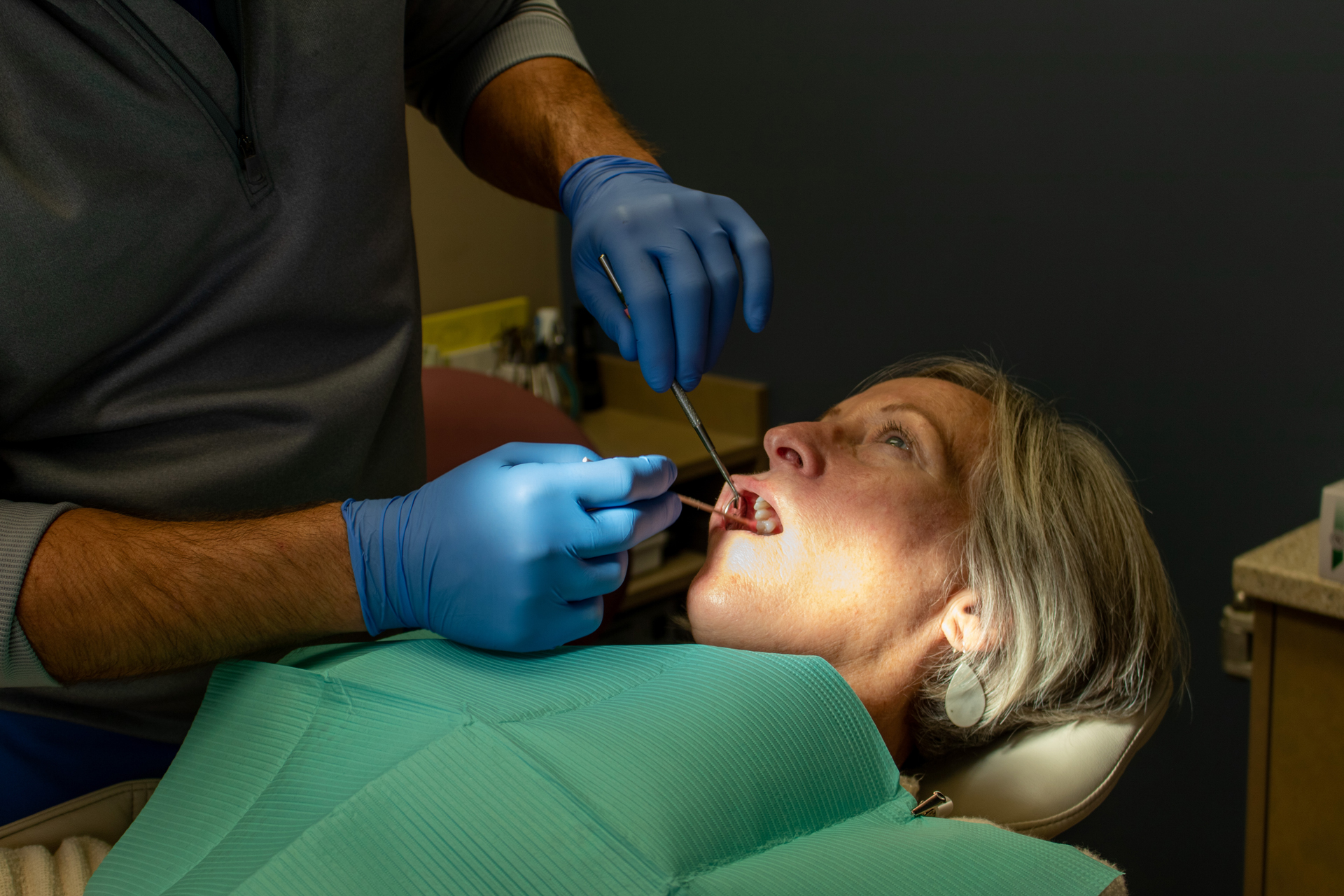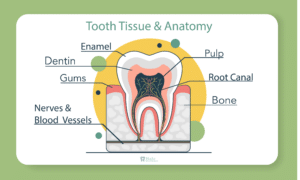What is an emergency extraction?
A severely damaged, decayed, or painful tooth may need an emergency extraction if it cannot be saved through other dental treatments. The primary goal is to alleviate pain, prevent complications such as infection, and preserve oral health.
There are two main types of dental extractions: simple extractions and surgical extractions. Simple extractions (aka routine extractions) involve removing a tooth above the gumline, usually with forceps. Surgical extractions require an incision for a tooth that has not fully erupted or is broken below the gum line. Both require precision, patience, and skill. Dr. Hale has extensive experience performing both types of extractions.
Surgical extractions are much more complex in procedure and skill. Each case is different but often requires specialized techniques such as sectioning the tooth or making an incision to remove the tooth. Conversely, routine extractions have shorter appointment times and shorter recorvery time.
Save Your Natural Tooth or Opt for Extraction
Make an informed decision regarding your tooth. When faced with a tooth infection or possible extraction, it’s essential to assess the severity of the issue and explore the possibility of saving the tooth before making any decisions. Preserving your natural tooth should always be a priority. No tooth replacement option can fully replicate a natural tooth’s functionality. Understanding the options available to you and knowing when a tooth cannot be saved is crucial to maintaining your oral health now and for the rest of your life.
Here are some things to consider:
- Preventing complications: If a damaged or infected tooth is not treated promptly, it can lead to more severe complications, such as an abscess, gum disease, or the spread of infection to nearby teeth and tissues.
- Preserving oral function: Losing a tooth can impact your ability to chew, speak, and maintain proper alignment of your remaining teeth. Knowing your options can help you make the best decision to preserve your oral function.
- Aesthetics and self-confidence: A missing or severely damaged tooth can affect your appearance and self-confidence. Understanding the available treatments allows you to choose the best option to restore your smile and confidence.
- Overall health: Poor oral health can contribute to various health issues, including heart disease, diabetes, and respiratory infections. Knowing when a tooth cannot be saved and opting for appropriate treatment helps maintain your overall health.
- Faster recovery: Understanding your options and seeking timely treatment can help speed up the healing process and reduce the risk of complications.
- Long-term benefits: While some treatments like dental implants may have higher upfront costs, they can offer better long-term outcomes than having a missing tooth, thus making them a more cost-effective choice in the long run.
Alternative to Tooth Extraction
A root canal, also known as endodontic treatment, is often recommended as an alternative to an emergency tooth extraction, mainly when the tooth can still be saved. This procedure aims to preserve the natural tooth by removing the infected or damaged pulp, cleaning the root canals, and sealing the tooth to prevent future infections.
In some cases, despite your best efforts, a tooth might be beyond saving. When presented with severe tooth pain or possible infection, your dentist will examine to determine the best treatment plan. If the tooth’s structure is still intact and has not been severely compromised, a root canal may be recommended as a preferable option over an extraction.
Pain Management and Post-Extraction Care
Experiencing a toothache can be highly distressing, and finding immediate relief is crucial for your well-being. During your appointment, Dr. Hale will assess your situation carefully. Your level of pain, risk for infection, and medical history are some of the most critical considerations in determining how to move forward. After a thorough exam and X-rays, Dr. Hale can discuss the best course of action for your unique needs.
Depending on the severity of your condition, Dr. Hale may prescribe antibiotics to combat the infection, refer you to an Oral Surgery Center, or proceed with the tooth extraction in the dental office. Rest assured that our team is committed to providing you with the most effective and comfortable treatment possible.
Antibiotics to Treat Toothache
A dentist may prescribe antibiotics to treat a toothache when they suspect the pain is caused by a bacterial infection in or around the tooth. Common sources of such infections include tooth decay, gum disease, or abscess. Antibiotics are used to target and eliminate harmful bacteria, reducing infection and inflammation, thereby alleviating pain and preventing the infection from spreading to other areas of the mouth or the rest of the body.
Swollen and infected teeth often react poorly to anesthesia, a problem when performing dental procedures. There may be instances where Dr. Hale may prescribe an antibiotic for a few days before the procedure to lessen the infection. Treating the infection will reduce dental pain and make you to be more comfortable before and after the tooth extraction.
Referral to an Oral Surgeon
At Hale Family Dentistry, we a wide range of comprehensive dental services, and our office is fully equipped to handle many dental emergencies on-site conveniently. In certain cases, Dr. Hale may determine the treatment requires specialized attention. We collaborate closely on a daily basis with local Specialty Dentists for oral surgery and complex care. Our trusted Fort Wayne Oral Surgeons can ensure you get the best care dedicated to your needs. These scenarios include wisdom teeth removal or medical disorders that require additional resources or proper equipment to complete treatment.
Oral surgeons will require a referral from a general dentist before they can evaluate and treat patients. This referral process helps ensure that the most qualified professional addresses your dental needs. If Dr. Hale determines that he cannot perform the extraction, he will provide you with a formal referral to a specialist who is well-equipped to handle your case. Our primary goal is to deliver safe, effective, and seamless dental care for all our patients, prioritizing their well-being and satisfaction.
How We Make You Comfortable
To ensure your comfort during the tooth extraction procedure, we can provide a soothing environment using aromatherapy, weighted blankets, and pillows upon request. We can also administer nitrous oxide, also known as laughing gas, to help take the anxiety away and help a patient relax during the dental visit.
Our dental team provides a positive and stress-free experience, so don’t hesitate to discuss your preferences and concerns with us. We will work together to customize your experience and ensure you feel as comfortable as possible throughout your dental extraction.
What to Expect After Procedure
Following a tooth extraction, the empty socket requires time to heal. Soft foods and avoidance of hot drinks can promote comfort and recovery. Letting a blood clot form in the socket is crucial, fostering healing. Sensitivity might occur post-procedure.
The importance of post-extraction care can not be overstated.
It’s vital to managing pain and minimizing potential risks. Instructions for managing discomfort will be given, along with a gauze pad to help control any bleeding. Following the dentist’s directives and maintaining meticulous oral hygiene in the following hours and days are vital to a smooth recovery.
Avoid the following:
- Drinking through a straw: The suction created while using a straw may dislodge the blood clot, leading to a condition called dry socket.
- Smoking: Smoking can delay the healing process and increase the risk of infection.
- Vigorous rinsing or spitting: Forceful actions can dislodge the blood clot and impede the healing process.
- Consuming hot foods and beverages: High temperatures can increase swelling and discomfort.
- Chewing on the extraction site: Avoid chewing on the side of the extraction to prevent irritation and damage to the affected area.
- Alcohol consumption: Alcohol can interfere with blood clot formation and delay healing.
Touching the extraction site: Keep your fingers and tongue away from the area to prevent infection. - Hard or crunchy foods: Stick to soft foods for the first few days to avoid irritation and damage to the extraction site.
Avoiding these actions after tooth extraction can help ensure a faster and more comfortable healing process.
Tooth Replacements Solutions
After a tooth extraction procedure, it is important to consider tooth replacement options to maintain optimal oral health, function, and aesthetics. Several options are available, including dental implants, dental bridges, and removable partial dentures. Each option has its advantages and may suit different individual needs and preferences. Dental implants are considered the gold standard, offering a stable and long-lasting solution that closely resembles a natural tooth. Dental bridges and removable partial dentures are more affordable alternatives that can still effectively restore function and appearance. It is essential to discuss these options with your dentist to determine the best choice for your unique situation.
In conclusion, most general dentistry professionals actively perform tooth removal, handling both emergency tooth extractions and routine procedures. It’s best to discuss all options to determine the best option for your unique situation.
FAQ
How much does a tooth extraction cost?
You can expect to pay between $200-$500 per tooth. The cost depends on the dentist’s procedure since there are two types of extractions: Surgical and Routine. Routine extraction is more affordable because they are less invasive and use fewer resources to complete the treatment.
*This cost does not reflect X-Ray charges, examination, sedation, or other necessary costs that a patient may accumulate during this dental visit. Please ask for a quote before your appointment for a better estimate.
How long does the tooth extraction process take?
You can expect your emergency tooth extraction to last about an hour, but that depends on a few factors. One is the dental treatment’s complexity, and another depends on patient tolerability.
The dental assistant will prepare the room with all the necessary dental instruments to complete the procedure. Then, the dentist will administer local anesthesia and nitrous oxide (if requested) for pain relief and comfort. Depending on its complexity, it can take 30-40 minutes. Simple extractions tend to take less time than surgical treatments.


